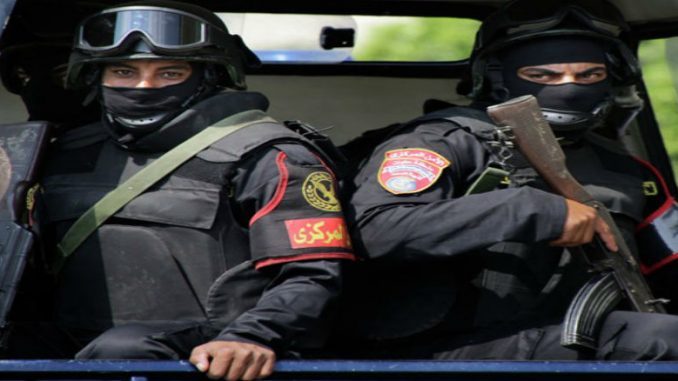
Egypt’s Interior Ministry said in a statement that it killed Hassan Mohamed Galal Mustafa, a student at Al-Azhar University when they were attempting to arrest him,while the student was forcibly disappeared by security forces 3 months ago, according to Al-Shehab Center for Human Rights.
Al-Shehab Center for Human Rights previously documented the illegal detention of Hassan Mohamed Galal Mustafa and other 6 people at al-Sharqeya Governorate by the Egyptian police forces since 26 December,2016.
Hassan and the other detainees were taken to an unknown place and the police forces didn’t want to say their whereabouts.
Accordingly, al-Azhar student had been under enforced disappearance for about three months before the Egyptian authorities announced that he was killed during shootout.
The announcement comes only few days after the interior ministry claimed that its forces had killed four youths during a raid in Giza.
Egypt’s interior ministry claimed that they were terrorists plotting to carry out hostile operations.
The ministry said in a statement,”The men were killed after opening fire on security forces..” – a claim that is always repeated by the interior ministry in similar cases of liquidation.
In the same context, Egypt’s Interior Ministry has announced last January that it killed 10 people in a shootout in al-Arish.
However, Al-Arish residents said that those who were killed had been in police custody since October.
As a result, Amnesty International urged Egypt to investigate Sinai killings by police.
“Egypt must launch an independent and thorough investigation into the recent killing of 10 men by security forces in the Sinai Peninsula,” said Amnesty International.
It also added that hundreds more are held under conditions of enforced disappearance or arbitrarily detained outside judicial oversight.
This is not the first time that Egypt’s Interior Ministry claims that its forces killed elements of terrorist groups which was proved in most cases that the victims were held in police custody or were under enforced disappearance.
There were many cases when the Egyptian security forces killed people with cold blood and then they fabricate a story to justify their illegal actions, as the killing of five people who were all shot dead by security forces while they were on a micro bus, for being behind the murder of Guilio Regeni, according to the story of the Interior Ministry .
However, Egypt’s Prosecutor General said that the investigation on the case has shown strong doubts about the authenticity of accusing the five Egyptians killed on March 24.
During a meeting with Rome’s Chief Prosecutor Giuseppe Pignatone and Italian investigation team last December, the prosecutor general informed the Italian investigators that this accident was used by the security forces as “a coverage “to hide the real murderer and accordingly he has referred two of the police officers, who participated in killing the five victims, to investigations to know the truth about what happened especially that there was no exchange of fire with the five victims as claimed by the security forces.
The investigation team didn’t find any blood traces inside the micro bus which means that they were killed outside it. Accordingly, they weren’t attacking the police forces and this means that they were killed previously.
Giulio Regeni, the Ph.D. student who was doing postgraduate research into Egyptian trade unions, disappeared on the fifth anniversary of January Revolution.
The Cambridge University student’s body was found brutally tortured in a roadside ditch on the outskirts of the Egyptian capital, on February 3, 2016. His mother said that she could only recognize him by his nose.
Torture found on Regeni’s body showed the signs of Egypt’s security forces which are known for using violence against detainees to gain information and confessions.
In fact, since Abdel Fattah al-Sisi led a military coup against Egypt’s first democratically elected president Mohamed Morsi, the Egyptian authorities have engaged in one of the widest arrest campaigns in the country’s modern history, targeting a broad spectrum of political opponents.
Between June 2013 and May 2014, Egyptian authorities arrested or charged at least 41,000 people, and 26,000 more may have been arrested since the beginning of 2015.
Enforced disappearance, arbitrary detention, military trials, and human rights violations at Egypt’s prisons have marked al Sisi’s reign.
In July 2016, Amnesty International has released a report saying that hundreds of Egyptians have been forcibly disappeared and tortured in a “sinister” campaign to wipe out peaceful dissent in the most populous country in the Arab world, reported The Guardian.
“Enforced disappearance has become a key instrument of state policy in Egypt. Anyone who dares to speak out is at risk, with counter-terrorism being used as an excuse to abduct, interrogate and torture people who challenge the authorities,” said Philip Luther, Amnesty’s Middle East and North Africa director.
Egypt’s police have been implicated in an “unprecedented spike” in enforced disappearances since early 2015 aimed at quashing dissent, Amnesty International said in its report.
The London-based rights organization said abuses have escalated since the military coup in 2013 as the Egyptian security forces have been launching a massive crackdown on Islamist and secular opposition. However, most of those who have “disappeared” are among the Islamic opposition and the supporters of Mohamed Morsi.
Even children weren’t saved from the Egyptian security forces’ violations. Children as young as 14 as well as students, political activists and protesters have vanished without any trace after security forces raided their homes.
Many have been held for months at a time and kept blindfolded and handcuffed. At least 34,000 people are behind bars, the government admits. The report said children were among those being kept at undisclosed locations for up to several months at a time “to intimidate opponents and wipe out peaceful dissent.”
Moreover, the Amnesty report highlighted that enforced disappearances have hiked since Magdy Abd el-Ghaffar was appointed to head the ministry in March 2015. Abd el-Ghaffar used to serve in Egypt’s state security investigations, the secret police force notorious for abuses under Mubarak. Detainees said methods of torture were the same as those used in the Mubarak era.
The report sheds light not only on the brutality faced by those forcibly disappeared but also to the overlapping relation and coordination between national security forces and judicial authorities, who have been prepared to lie to cover their tracks or fail to investigate torture allegations, making them complicit in serious human rights violations.
The report says prosecutors have based charges on “confessions” extracted under coercion but they didn’t investigate torture allegations by ordering medical examinations. Detainees have been referred by prosecutors to an independent medical examination in very rare occasions and their lawyers have not been permitted to see the results.
Amnesty documented the cases of 17 people who were held incommunicado for periods ranging between several days to seven months and denied access to their lawyers or families or any independent judicial oversight.
In the same context, the Egyptian Coordination for Rights and Freedoms (ECRF), a non-governmental rights group, released a report on enforced disappearance covering the period from the beginning of January 2016 to the end of June. The Egyptian rights group said that it documented 1000 enforced disappearances cases in the first half of 2016, at a rate of 5 cases per day.
The ECRF has also reported “1000 cases of enforced disappearance of civilians by the security forces in the first half of this current year.” It pointed that,”232 citizens were subjected to enforced disappearance in January, 204 citizens in February, 184 citizens disappeared in March, 111 citizens disappeared in April, 201 in May, and 69 citizens disappeared in June, compared to 1873 cases of enforced disappearances in the whole year of 2015.” The local rights group said, “several cases appeared later in custody but after a long period of time and others are killed, most of these accusations are denied by the Ministry of Interior.”
It added that it documented 2811 cases of enforced disappearances by the Egyptian security since July 3 2013 (the date when Mohamed Morsi, the first democratically elected president, was ousted) till the end of last June. The ECRF explained that the enforced disappearance of the political activists aims to “obtain confessions on certain information, or a certain case, or to force their relatives to surrender themselves in case they were wanted by the security forces.”



